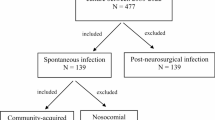Abstract
Objectives:
Despite improvements in diagnostic and therapeutic approach to adult patients with bacterial meningitis, the overall mortality rate is still high. The aim of this study was to evaluate antibiotic timing in the course and outcome of bacterial meningitis.
Methods:
Two hundred and eighty six patients with community-acquired bacterial meningitis aged 14 years and more were included in this retrospective cohort study. Observational period was between 1 January 1990 and 31 December 2004. To assess the association of antibiotic timing and disease outcome we analyzed three timing periods (according to the onset of disease, onset of consciousness disturbance and the time of admission to hospital). Analysis was also performed in a subgroup of culture positive meningitis in 176 patients with altered mental status.
Results:
Unfavorable outcome was found in 125 (43,7%) patients. In this group, the start of appropriate antibiotic treatment in relation to the onset of first symptoms and particularly to the onset of consciousness disturbance was significantly delayed (p = 0.018 and p < 0.001, respectively) compared to the favorable group. Logistic regression analysis in a subgroup of culture positive meningitis in patients with altered mental status revealed that early adequate antibiotic treatment related to the onset of overt signs of meningitis was independently associated with favorable outcome (OR = 11.19; 95% CI 4.37–32.57; p < 0.001). Advanced age, lower GCS and seizures (OR = 1.05, OR = 1.45 and OR = 3.65, respectively) were other risk factors of poor outcome. The presence of chronic diseases, pneumococcal etiology and clinical and laboratory variables which are indicators of disease severity (renal and/or liver dysfunction, hypotension and low cerebrospinal fluid glucose) were not confirmed as independent risk factors of poor outcome.
Conclusions:
Our study emphasizes the importance of early and adequate antibiotic treatment in the management of bacterial meningitis which significantly enhances the chances for favorable outcome.
Similar content being viewed by others
Author information
Authors and Affiliations
Corresponding author
Rights and permissions
About this article
Cite this article
Lepur, D., Baršić, B. Community-Acquired Bacterial Meningitis in Adults: Antibiotic Timing in Disease Course and Outcome. Infection 35, 225–231 (2007). https://doi.org/10.1007/s15010-007-6202-0
Received:
Accepted:
Published:
Issue Date:
DOI: https://doi.org/10.1007/s15010-007-6202-0




